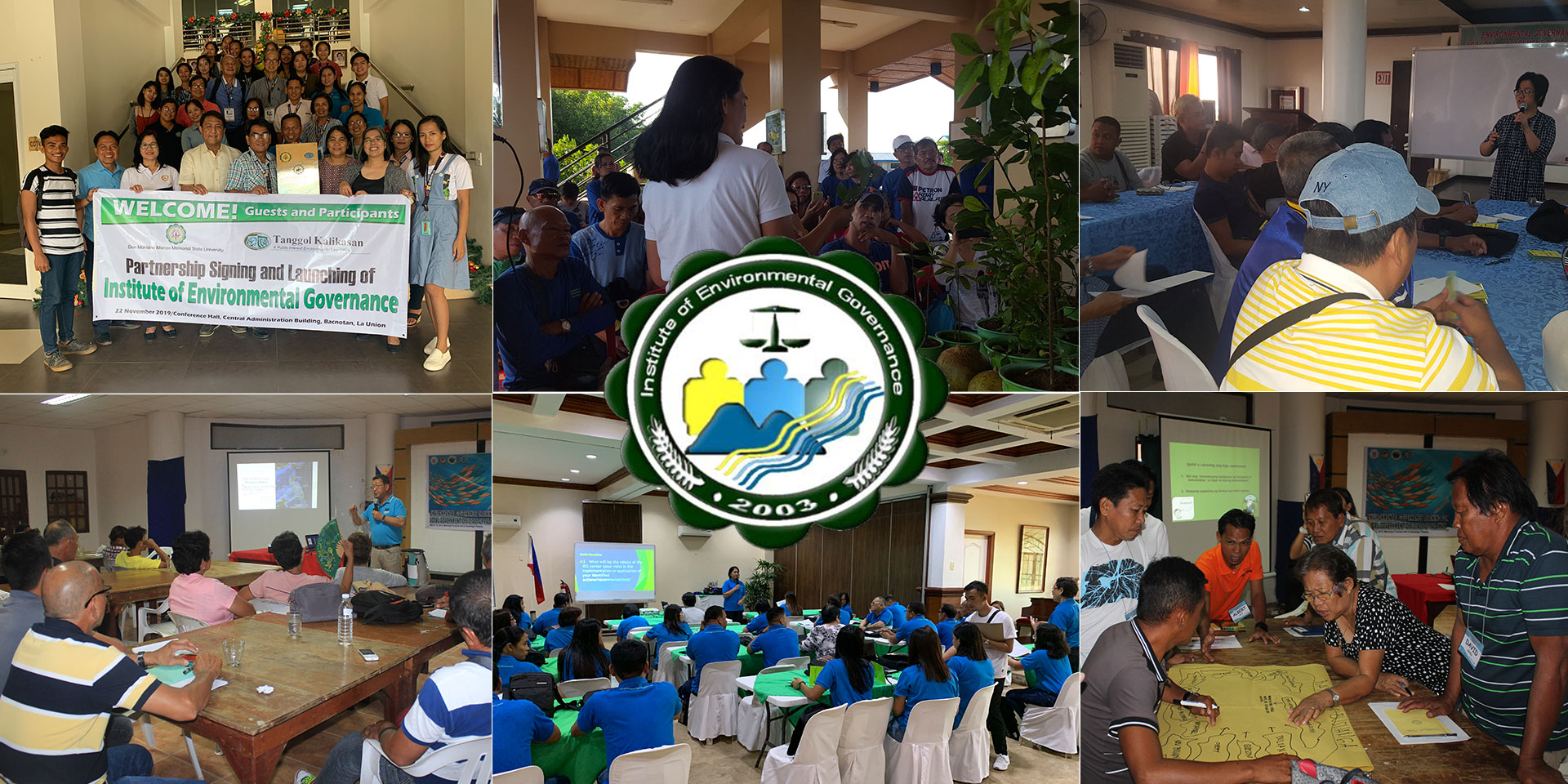The Institute of Environmental Governance Program or IEG is the strategic response to the ever-increasing demand for capacity building of LGUs. The Program caters to two levels. Level One (I) shall be designed to serve the needs of Barangay Officials and Level Two (II) shall cater to the needs of Municipal, City and Provincial Officials. Both levels will be housed in partner Academic Institutions.
The IEG Training Program is fully accredited by the LoGoTRI-PhilNet with four stars rating.
-
Rationale
With the devolution of government powers accompanying the passage of the Local Government Code of 1991 (R.A. 7160), local government units (LGUs) were granted powers to effect governance in their respective jurisdictions. Among the devolved functions are those that used to be solely under the environment department, like pollution regulation and solid waste management, management of communal forests and adoption of integrated social forestry, small scale mining regulation, and other related functions. Fisheries management and regulatory functions in municipal waters have likewise been devolved to local governments. Barangay Captains are specifically tasked to “enforce laws and regulations relating to pollution control and protection of the environment.” Mayors, on the other hand, are mandated to adopt measures to safeguard and conserve the natural resources of the municipality or city. Indeed, with the passage of the local government code and other relevant environmental legislations, increasing power and responsibility on the environment have been passed or granted to local governments. However, the devolution of these powers and responsibilities does not necessarily equate to actual transfer of capacity, thus there is a challenge of providing the much- needed capacity to enable local executives and local policy makers better perform their given mandate.
-
The Institute
A Local State College or University shall host the IEG Level 1 and Level 2 in each Region or province in Luzon, Visayas, and Mindanao. Each area-based IEG shall be managed autonomously under a joint management scheme between the host institution and Tanggol Kalikasan.
To foster stewardship and shared responsibility, the program requires counterpart from the participant LGUs in the form of their transportation, food and accommodation expenses during the training.
-
Training Approaches
Each training program is designed using the Integrated Ecosystems Approach, wherein a common resource base such as a bay, gulf, watershed, or declared protected area is considered, and, as far as practicable, training participants come from one contiguous area. The Institute will endeavor to design its projects towards the attainment of specific and measurable impacts on the common resource as a result of the integrated action plan output of the participants.
The specific and measurable impacts identified in the action plans are assessed after a period of six months to one year from the conduct of training through a monitoring and evaluation activity. The impact of the training is monitored, not only on the participant, but on the identified common resource base as well.
-
The Faculty
A roster of highly qualified individuals from the academe, government and the private sector who are equipped with both the theoretical and practical aspects of environmental governance shall be maintained. They shall become the core faculty members of each Institute.
-
Training Design
Subject to adjustment and specific training design for a particular ecosystem, the Institute’s training framework shall include: (1) Basic Ecological Principles (2) Applicable Resource Management Models (3) Relevant Environmental Policies (4) Basic Enforcement Skills (5) Integrated or Specific Area Action Planning (ASAP).
Each training shall have a duration of three (3) to four (4) days and will be presented using popular education techniques.
-
IEG Centers
Region I
- Pangasinan State University
- Don Mariano Marcos State University
- Mariano Marcos State University
- University of Northern Philippines
Region II
- Batanes State College
- Quirino State University
- Isabela State University
- Nueva Vizcaya State University
Region III
- Aurora State College of Technology
- Central Luzon State University
- Bulacan State University
NCR
- De La Salle University (Jesse Robredo Institute of Governance)
Region IV-A
- Southern Luzon State University
- Batangas State University
Region IV-B
- Palawan State University
- Western Philippines University
Region V
- Bicol University
- Catanduanes State University
Region VII
- Holy Name University
Region VIII
- Visayas State University
Region IX
- Western Mindanao State University
Region X
- Bukidnon State University
Region XI
- Ateneo De Davao University
Region XIII
- Father Saturnino Urios University
ARMM
- Mindanao State University (Tawi-Tawi)
- Mindanao State University (Marawi City)

